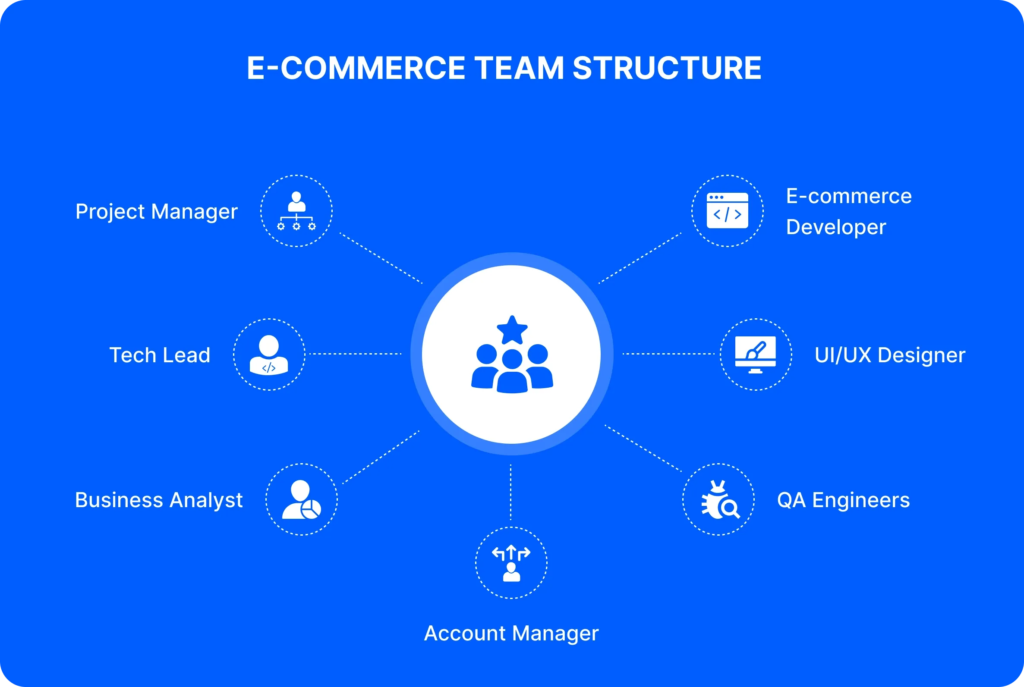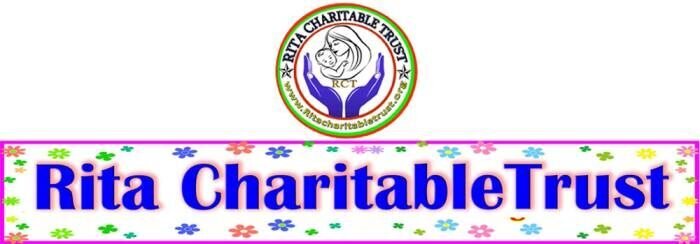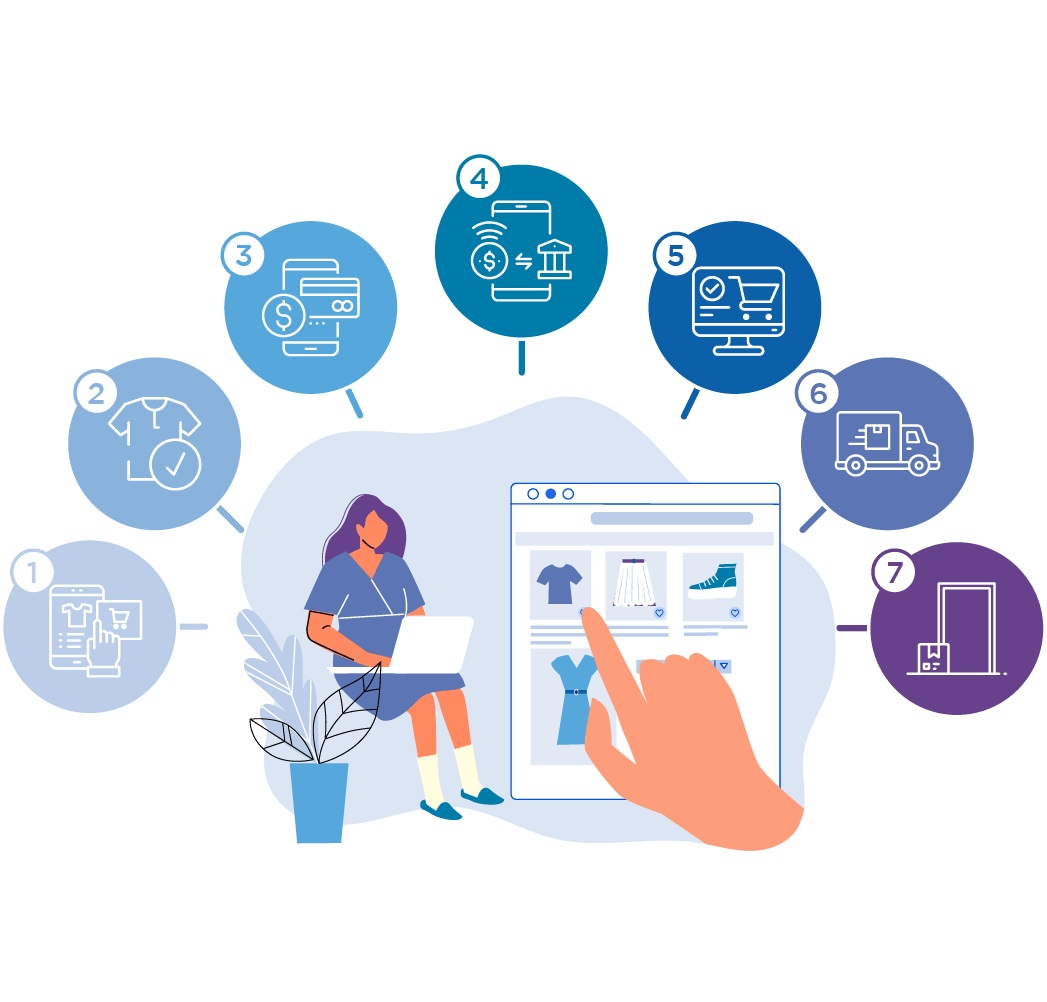E-commerce Team Lead (1 years diploma)
E-commerce Team Lead click here
Brief Job Description: The individual performs data analysis, forecasting,
manages team, supervises day-to-day operations in order processing and reverse
logistics, and prepares daily reports.
Qualifications Pack for E-commerce Team Lead

Options
Option 1: Business Development
The unit is about performing business development and enhancing relations with key
stakeholders and clients
Option 2: Category and Catalogue Management
The unit is about performing category management, reviewing information for identifying
market requirements and planning the catalogue design and product mix in accordance to it
Personal Attributes: The job requires the individual to be able to work in shifts with
multiple stakeholders, prioritize and execute tasks within scheduled time limits,
disciplined, attention to details and must have good quantitative aptitude. The person
should have good observation, team management, communication and analytical skills.
Description
Core Skills/Generic
Skills
Core Skills or Generic Skills are a group of skills that are key to learning and
working in today’s world. These skills are typically needed in any work
environment. In the context of the NOS, these include communication related
skills that are applicable to most job roles.
Function
Function is an activity necessary for achieving the key purpose of the sector,
occupation, or area of work, which can be carried out by a person or a group
of persons. Functions are identified through functional analysis and form the
basis of NOS.
Job role Job role defines a unique set of functions that together form a unique
employment opportunity in an organization.
Knowledge and
Understanding
Knowledge ing are statements which together specify the technical, generic,
professional and organizational specific knowledge that an individual needs in
order to perform to the required standard.
National Occupational
Standards (NOS) NOS are Occupational Standards which apply uniquely in the Indian context
Occupation Occupation is a set of job roles, which perform similar/related set of functions
in an industry.
Organisational Context
Organisational Context includes the way the organization is structured and
how it operates, including the extent of operative knowledge managers have
of their relevant areas of responsibility.
Performance Criteria Performance Criteria are statements that together specify the standard of
performance required when carrying out a task.
Qualifications
Pack(QP)
Qualifications Pack comprises the set of NOS, together with the educational,
training and other criteria required to perform a job role. A Qualifications
Pack is assigned a unique qualification pack code.
Electives Electives are NOS/set of NOS that are identified by the sector as contributive
to specialization in a job role. There may be multiple electives within a QP for
each specialized job role. Trainees must select at least one elective for the
successful completion of a QP with Electives.
Options Options are NOS/set of NOS that are identified by the sector as additional
skills. There may be multiple options within a QP. It is not mandatory to select
any of the options to complete a QP with Options.
Unit Code Unit code is a unique identifier for an Occupational Standard, which is
denoted by an ‘N’
Unit Title Unit title gives a clear overall statement about what the incumbent should be
able to do.
Qualifications Pack
Code
Qualifications Pack Code is a unique reference code that identifies a
qualifications pack.
Scope
Scope is the set of statements specifying the range of variables that an
individual may have to deal with in carrying out the function which have a
critical impact on the quality of performance required.
Sector
Sector is a conglomeration of different business operations having similar
businesses and interests. It may also be defined as a distinct subset of the
economy whose components share similar characteristics and interests.
Sub-Sector Sub-sector is derived from a further breakdown based on the characteristics
and interests of its components.
Sub-functions Sub-functions are sub-activities essential to fulfil the achieving the objectives
of the function.
Technical Knowledge Technical Knowledge is the specific knowledge needed to accomplish specific
designated responsibilities.
Description
3PL Third-party logistics
5S Sort, Set In order, Shine, Standardize and Sustain
CGST Central Goods and Services Tax
DC Delivery Centre
ERP Enterprise Resource Planning
FC Fulfilment Centre
FIFO First-in-first out
FILO First-in-last-out
GST Goods and Services Tax
GPS Global Positioning System
HR Human Resources
IGST Integrated Goods and Services Tax
IT Information Technology
JIT Just in time
MHE Material Handling Equipment
MIS Management Information System
MMS Material Management System
NSQF National Skills Qualifications Framework
OH&S Occupational Health and Safety
OS Occupational Standards
OSHA Occupational Safety and Health Administration
PGAs Partner Government Agencies
PO Purchase order
PPE Personal Protective Equipment
QP Qualifications Pack
RFID Radio Frequency Identification
SBU Strategic Business Unit
SKU Stock Keeping Unit
SLA Service level agreements
SOP Standard Operating Procedure
TAT Turnaround Time
TMS Transport Management System
WMS Warehouse Management System
Allocate resource and streamline operations in E-commerce
Description This unit is about supervising on ground courier operations
Scope This unit/task covers the following:
• Prepare daily plan and allocate resources
• Monitor daily operations
Range: Stationery, Radio Frequency Identification (RFID) scanner, bar code scanner,
Enterprise Resource Planning (ERP), markers, Personal Protective Equipment (PPEs),
computer, printers, Global Positioning System (GPS) tracker, Material Handling
Equipment (MHEs), etc.
Performance Criteria(PC) w.r.t. the Scope
Element Performance Criteria
Prepare daily work
plan and allocate
resources
To be competent, the user/ individual must be able to:
PC1. obtain order details from the order processing team and other information
such as transport plans, delivery schedules, priority orders etc.
PC2. check inventory and approve order delivery from the identified
fulfilment/delivery centre
PC3. develop daily work plan for despatch of items, factoring in priority cases,
cases requiring exceptional handling
PC4. get the work plan approved from the manager and allocate tasks to workers
and associates
PC5. budget and allocate the resources for different tasks at hand
Monitor daily
operations
To be competent, the user/individual on the job must be able to:
PC6. conduct fulfilment/delivery centre inspections to review the status of
different on-going activities during the day
PC7. monitor the work to ensure that documentations and operations are carried
out as per plan
PC8. engage resources in alternate operation when there is a delay of planned
operations
PC9. allocate additional and ad-hoc manpower and equipment during exigency
PC10. conduct daily review with team on the allocated work to update status and
improvise the process
PC11. coordinate with other departments, contractors, transporters, freight
operators, clients, shipping companies, customs, regulatory bodies and others
to resolve escalations if required
PC12. escalate the cases that require external support to the manager for quick
resolution
PC13. review escalated issues and identify root cause for providing corrective and
preventive action.
Knowledge and understanding (K)
A. Organizational
Context
(Knowledge of the
company /
organization and
its processes)
The individual on the job needs to know:
KA1. organizational procedures
KA2. different hubs and service stations of the organization
KA3. documentation and reporting as per organization’s mandate
KA4. security procedures to be followed
KA5. escalation matrix for reporting identified problems
KA6. risk and impact of not following defined procedures/work instructions
KA7. coding system followed to label mail
KA8. the ERP system of the organization
B. Technical
Knowledge
The individual on the job needs to know:
KB1. use of a computer and associated equipment
KB2. basic trouble shooting regarding material handling equipment
KB3. scheduling, planning, etc.
KB4. geographical locations and route maps
KB5. information from the ERP/ Management Information System (MIS) system
KB6. labels and instructions
KB7. various escalations regarding resolving and catering to the customer query
KB8. overall process from pickup to delivery and different departments engaged in
the process
KB9. different types of goods being handled
KB10. special characteristics and handling requirements of goods, if any
Skills (S)
A. Core Skills/
Generic Skills
Reading skills
The user/individual on the job needs to know how to read:
SA1. written instructions
SA2. product instructions as per the invoicing label and shipment labels
SA3. information from ERP reports and computer generated reports
SA4. management directions
Writing skills
The user/individual on the job needs to know how to:
SA5. write work-orders and instructions for resources
SA6. prepare list of activities, delays, undelivered items, contacts, etc
SA7. write end of the day reports
Oral communication (listening and speaking skills)
The user/individual on the job needs to know how to:
SA8. communicate clearly in local language or English with customers and various
internal departents and workers
SA9. communicate and collect information from different departments
B. Professional Skills Decision Making
The user/individual on the job needs to know how to:
SB1. decide if a problem can be resolved quickly internally or needs to be escalated
SB2. which department to escalate the query to
SB3. decide on actions to be taken on any issues identified for not following
turnaround time (TAT)
Plan and Organize
The user/individual on the job needs to know how to:
SB4. plan and estimate the co-ordination required for resolving a querry.
SB5. maintain puntuality and avoid absenteeism
SB6. respond to the client in a timely manner
SB7. prioritize and execute tasks based on client requirements
SB8. make work plans and resource allocation plans
SB9. make checks on execution of work plans
SB10. be a team player and achieve joint goals
Customer Centricity
The user/individual on the job needs to know:
SB11. importance of customer timelines
SB12. urgency of customers
Problem Solving
The user/individual on the job needs to know how to:
SB13. identify trends/common causes for delays, issue in tracking, etc. and resolve
the same over call with the client
SB14. co-ordinate and handle major issues with different departments
SB15. identify small bottlenecks and operational problems and provide alternate
solutions for the same
SB16. identify challenges in delivery and pickup operations and accordingly suggest
remedial actions
Analytical Thinking
The user/individual on the job needs to have:
SB17. assess the resource requirement for a particular task at hand
SB18. analyse team performance and department performance
SB19. plan for shipment movement so that the resources are optimally utilised

Critical thinking
The user/individual on the job needs to have:
SB20. resolve issues in a qucik and cost effective manner
SB21. improve work processes by adopting best practices
SB22. act upon constructively on any problems as pointed by manager
SB23. encourage coordination and cooperation among team members
SB24. delegate work appropriately
Forecast demand and process data
Description This unit is about filtering and processing data and making forecasts
Scope This unit/task covers the following:
• Filter and process data
• Forecast demand
Range: MS office, Enterprise Resource Planning (ERP), Analytical tools, computer,
stationery, worksheets, etc.
Performance Criteria(PC) w.r.t. the Scope
Element Performance Criteria
Process data and
draw inferences
To be competent, the user/ individual must be able to:
PC1. collect data from ERP and analyse trends of new requirements, sales, website
hits, procurement, delivery, seasonality, etc.
PC2. analyse reverse logistics data and prepare report on return performance as
per company standards
PC3. analyse order processing data and prepare report on order processing
performance as per company standards
PC4. correlate the findings with market reports to draw insights from data and
suggest improvements in operations to manager
Forecast demand To be competent, the user/ individual must be able to:
PC5. use the appropriate forecasting methodology to understand future demand
based on past trend analysis
PC6. make predictions and prepare initial forecasts to plan for resource allocation,
order processing and delivery
PC7. discuss with respective departments based on the forecast
PC8. finalise activity/contingency plans based on feedback
PC9. conduct periodic review of forecast and revise accordingly
Knowledge and understanding (K)
A. Organizational
Context
(Knowledge of the
company /
organization and
its processes)
The individual on the job needs to know:
KA1. vision, mission and values of the company
KA2. business and performance of the company
KA3. organisation structure of the company to have better understanding of
various departments and skills set present in the company
KA4. knowledge repository and various projects done by the company
KA5. reporting structure to support and expedite project acivities
KA6. company’s policy and work instructions on quality standards
KA7. company’s policy on procument and vendor mananagement
KA8. company’s personnel management and incentives rules
KA9. importance of the individual’s role in the workflow
KA10. occupational health and safety standards
KA11. company’s policy on business ethics and code of conduct
B. Technical
Knowledge
The individual on the job needs to know:
KB1. use of ERP software including Warehouse Management System (WMS),
Material Management System (MMS) and Transport Management System
(TMS)
KB2. tools for documentation: MS excel and MS Word
KB3. statistical and quantitative analysis tools
KB4. use of spreadsheets to tabulate and analyze the data
KB5. E-commerce value chain
KB6. supply chain management
KB7. forecasting process
KB8. E-commerce business model
Skills (S)
A. Core Skills/
Generic Skills
Reading skills
The user/individual on the job needs to know how to read:
SA1. company policy and standard work-related documents
SA2. emails and letters
SA3. data entries in the system
Writing skills
The user/individual on the job needs to know how to:
SA4. prepare reports on performance metrics
SA5. write mails, communications, letters, etc.
Oral communication (listening and speaking skills)
The user/individual on the job needs to know how to:
SA6. interact with team members to work efficiently
SA7. communicate effectively with colleagues and vendors to achieve smooth
workflow
SA8. communicate quality standards and performance metrics clearly to the team
SA9. listen to queries patiently and answer them aptly
B. Professional Skills Decision Making
The user/individual on the job needs to know how to:
SB1. decide on appropriate forecasting techniques
SB2. decide on actions to be take improver operational efficiency
Plan and Organize
The user/individual on the job needs to know how to:
SB3. plan and define methodology for forecasting
SB4. arrange for all supporting history data to arrive on decision
Customer Centricity
The user/individual on the job needs to know how to:
SB5. ensure realistic forecast of the manpower for smooth functioning of business
Problem Solving
The user/individual on the job needs to know how to:
SB6. contribute to quality of team work and achieve smooth workflow
SB7. identify and resolve issues due to technical or human error
SB8. select on parameters to arrive on realistic forecast
Analytical Thinking
The user/individual on the job needs to know how to:
SB9. analyse history data and arrive on realistic forecast
Critical thinking
The user/individual on the job needs to know how to:
SB10. create forecasting model to get results faster
Review and approve order processing
Perform order processing
Description This unit is about reviewing orders and approving them for delivery
Scope This unit/task covers the following:
• Perform and approve order processing and submit reports
Range: MS office, Enterprise Resource Planning (ERP), computer, stationery,
worksheets, etc.
Performance Criteria(PC) w.r.t. the Scope
Element Performance Criteria
Review and approve
order processing and
submit reports
To be competent, the user/ individual must be able to:
PC1. review the orders received from order processing department to ensure that
products are available for delivery from the respective fulfilment/delivery
centre (FC/DC)
PC2. allocate the orders to the alternate FC/DC if the products are not available in
the original FC/DC
PC3. track dispatch of orders from FC/DC on a periodic basis
PC4. coordinate with transporters/courier agencies for availability of
transportation
PC5. inspect handling damages and approve replacement
PC6. inspect packaging process and ensure compliance to Standard Operating
Procedure (SOP)
PC7. ensure product returns by customers are handled properly and stock levels
are appropriately updated
PC8. supervise defective product return to suppliers/sellers with necessary
documentation and transport charges
PC9. tally periodic order processing status and prepare performance reports
Knowledge and understanding (K)
A. Organizational
context
(Knowledge of the
company /
organization and
its processes)

The individual on the job needs to know:
KA1. vision, mission and values of the company
KA2. business and performance of the company
KA3. knowledge repository and various projects done by the company
KA4. reporting structure to support and expedite project activities
KA5. company’s policy and work instructions on quality standards
KA6. company’s policy on procumbent and vendor management
KA7. company’s personnel management and incentives rules
KA8. importance of the individual’s role in the workflow
KA9. occupational health and safety standards
KA10. company’s policy on business ethics and code of conduct
B. Technical knowledge
The individual on the job needs to know:
KB1. use of ERP software including Warehouse Management System (WMS),
Material Management System (MMS) and Transport Management System
(TMS)
KB2. tools for documentation: MS excel and MS Word
KB3. use of spreadsheets to tabulate and analyze the data
KB4. E-commerce value chain
KB5. supply chain management
KB6. just in time (JIT) mode of inventory management
KB7. First-in-first out (FIFO), First-in-last-out (FILO)
KB8. E-commerce business model
KB9. quality check standards
KB10. invoicing process
KB11. product type and its packaging standards
KB12. process of order processing
Skills (S)
A. Core skills/
generic skills
Reading skills
The user/ individual on the job needs to know how to read:
SA1. company policy and standard work-related documents
SA2. emails and letters
SA3. data entries in the system
Writing skills
The user/ individual on the job needs to know how to:
SA4. prepare reports on returns and orders processed
SA5. write mails
Oral communication (listening and speaking skills)
The user/ individual on the job needs to know how to:
SA6. interact with team members to work efficiently
SA7. communicate effectively with colleagues to achieve smooth workflow
B. Professional skills Decision making
The user/ individual on the job needs to know how to:
SB1. decide on actions to be taken on any issues identified for not following
turnaround time (TAT)
SB2. decide on product to be scrapped or recycled
Plan and organize
The user/ individual on the job needs to know how to:
SB3. plan and organise data to prepare reports
SB4. plan and organise tasks to achieve timely TAT
Customer centricity
The user/ individual on the job needs to know how to:
SB5. address issues related to order delays/ order cancellations
SB6. address issues of pilferage and damage
Problem solving
The user/ individual on the job needs to know how to:
SB7. coordinate with inbound and outounds leads for completion of order
SB8. identify and resolve issues due to technical or human error
Analytical thinking
The user/ individual on the job needs to know how to:
SB9. analyse demand and schedule resources
SB10. check status of orders is updated timey and without error
Critical thinking
The user/ individual on the job needs to know how to:
SB11. check timely submission of reports as per TAT
SB12. generate error free invoicing
Perform reverse logistics
Description This unit is about performing return-to-origin operations, processing claims and
preparing daily reports
Scope This unit/task covers the following:
• Perform reverse logistics and submit reports
• Prepare reports
Range: MS office, Enterprise Resource Planning (ERP), computer, stationery,
worksheets, etc.
Performance Criteria(PC) w.r.t. the Scope
Element Performance Criteria
Perform reverse
logistics and submit
reports
To be competent, the user/ individual must be able to:
PC1. review list of return requests and claims to be processed and check if they are
raised within permissible timeline
PC2. allocate work plan for courier agency/transporter team for pick-ups
PC3. follow up with courier agency/transporter team and update the status of the
pick-up in the system
PC4. coordinate with quality assurance team for quality check of the returned items
and collect feedback
PC5. follow standard operating procedures whether the product is recyclable, need
to be scrapped or returned to seller
PC6. approve report on each return case and share findings in the report with the
manager
PC7. approve product exchange to customer on a case to case basis
PC8. supervise defective product return to suppliers/sellers with necessary
documentation and transport charges
PC9. prepare periodic reports on the number of pending orders for return and
orders executed, product damage, replacement/cash return etc.
Knowledge and understanding (K)
A. Organizational
Context
(Knowledge of the
company /
organization and
its processes)
The individual on the job needs to know:
KA1. vision, mission and values of the company
KA2. business and performance of the company
KA3. knowledge repository and various projects done by the company
KA4. reporting structure to support and expedite project acivities
KA5. company’s policy and work instructions on quality standards
KA6.

company’s policy on procument and vendor mananagement
KA7. company’s personnel management and incentives rules
KA8. importance of the individual’s role in the workflow
KA9. occupational health and safety standards
KA10. company’s policy on business ethics and code of conduct
B. Technical Knowledge
The individual on the job needs to know:
KB1. use of ERP software including Warehouse Management System (WMS),
Material Management System (MMS) and Transport Management System
(TMS)
KB2. tools for documentation: MS excel and MS Word
KB3. use of spreadsheets to tabulate and analyze the data
KB4. E-commerce value chain
KB5. supply chain management
KB6. just in time (JIT) mode of inventory management
KB7. First-in-first out (FIFO), First-in-last-out (FILO)
KB8. E-commerce business model
KB9. quality check standards
KB10. product type and its packaging standards
KB11. process of order processing
KB12. process of reverse logistics
KB13. process of claims management
Skills (S)
A. Core Skills/
Generic Skills
Reading skills
The user/ individual on the job needs to know how to read:
SA1. company policy and standard work-related documents
SA2. emails and letters
SA3. data entries in the system
Writing skills
The user/ individual on the job needs to know how to:
SA4. prepare reports on returns and orders processed
SA5. write mails
Oral communication (listening and speaking skills)
The user/ individual on the job needs to know how to:
SA6. interact with team members to work efficiently
SA7. communicate effectively with colleagues to achieve smooth workflow
B. Professional Skills Decision Making
The user/ individual on the job needs to know how to:
SB1. decide on actions to be taken on any issues identified for not following
turnaround time (TAT)
SB2. decide on product to be scrapped or recycled
Plan and Organize
The user/ individual on the job needs to know how to:
SB3. plan and organise data to prepare reports
SB4. plan and organise tasks to achieve timely TAT
Customer Centricity
The user/ individual on the job needs to know how to:
SB5. address issues related to non-pickups of packages
SB6. address issues of pilferage and damage
SB7. ensure returns are planned as per customer’s convenience
Problem Solving
The user/ individual on the job needs to know how to:
SB8. identify reasons for non-pick ups and schedule again coordinating with last
mile team
SB9. identify and resolve issues due to technical or human error
Analytical Thinking
The user/ individual on the job needs to know how to:
SB10. analyse reasons of delays in returns and plan necessary action
SB11. check for error in claim’s process
Critical Thinking
The user/ individual on the job needs to know how to:
SB12. do timely submission of reports and processing of claims as per TAT
SB13. perform error free processing of data and maintaining customer satisfaction
Monitor inbound and outbound operations
Description This unit is about supervising E-commerce operations from inbound to outbound in a
hub or Delivery centre and prepare reports
Scope This unit/task covers the following:
• Supervise inbound operations
• Supervise outbound operations
Range: Stationery, Radio Frequency Identification (RFID) scanner, bar code scanner,
Enterprise Resource Planning (ERP), markers, Personal Protective Equipment (PPEs),
computer, printers, Global Positioning System (GPS) tracker, Material Handling
Equipment (MHEs), etc.
Performance Criteria(PC) w.r.t. the Scope
Element Performance Criteria
Supervise inbound
operations
To be competent, the user/ individual must be able to:
PC1. check if packages received from seller are unloaded after verification of
mandatory documentation
PC2. inspect unloading of goods and record spillages, breakages etc.
PC3. record if there is a mismatch between received quantity and quantity as
mentioned in the document
PC4. supervise quality check of received goods and record damages
PC5. check if packages/goods are sorted, segregated and stored in the right location
as per the ERP entry
PC6. verify the quarantined goods and approve for return to seller
PC7. prepare and submit daily/ periodic performance reports on inbound
operations
Supervise outbound
operations
To be competent, the user/ individual must be able to:
PC8. aggregate delivery orders, generate pick lists and allocate work as per priority
PC9. supervise packaging and ensure its executed as per product category
PC10. approve run sheet, share it with courier/transport agencies for delivery of
goods
PC11. follow-up with courier/transport agency on the status of delivery in the system
PC12. track delivery performance and undertake corrective and preventive actions to
improve turnaround time (TAT)
PC13. handle cases of pilferage and take appropriate action
PC14. prepare and submit daily/ periodic performance reports on inbound
operations

Knowledge and understanding (K)
A. Organizational context (Knowledge of the company /organization and its processes)
The individual on the job needs to know:
KA1. vision, mission and values of the company
KA2. business and performance of the company
KA3. organisation structure of the company to have better understanding of
various departments and skills set present in the company
KA4. knowledge repository and various projects done by the company
KA5. reporting structure to support and expedite project acivities
KA6. company’s policy and work instructions on quality standards
KA7. company’s policy on procument and vendor mananagement
KA8. company’s personnel management and incentives rules
KA9. importance of the individual’s role in the workflow
KA10. occupational health and safety standards
KA11. company’s policy on business ethics and code of conduct
B. Technical
knowledge
The individual on the job needs to know:
KB1. vendor management process
KB2. barcoding
KB3. invoicing process
KB4. using ERP software
KB5. tools for documentation: MS excel and MS Word
KB6. use of spreadsheets to tabulate and analyze the data
KB7. E-commerce value chain
KB8. supply chain management
KB9. inventory management process
KB10. product type and packing process
KB11. just in time (JIT) mode of inventory management
KB12. First-in-first out (FIFO), First-in-last-out (FILO)
KB13. E-commerce business model
KB14. quality check standards
KB15. packaging standards
Skills (S)
A. Core skills/
generic skills
Reading skills
The user/ individual on the job needs to know how to read:
SA1. company policy and standard work-related documents
SA2. emails and letters
SA3. data entries in the system
Writing skills
The user/ individual on the job needs to know how to:
SA4. prepare reports on delivery and return performance
SA5. write mails
Oral communication (listening and speaking skills)
The user/ individual on the job needs to know how to:
SA6. interact with team members to work efficiently
SA7. communicate effectively with colleagues and vendors to achieve smooth
workflow
SA8. communicate quality standards and performance metrics clearly to all the
employees in Delivery Centre (DCs) and hubs
SA9. listen to queries patiently and answer them aptly
B. Professional skills Decision making
The user/ individual on the job needs to know how to:
SB1. decide on actions to be taken on any issues identified for not following TAT
SB2. decide on delay in deliveries
Plan and organize
The user/ individual on the job needs to know how to:
SB3. plan and organise data to prepare reports
SB4. plan and organise work schedule to achieve smooth workflow from inbound
to outbound
Customer centricity
The user/ individual on the job needs to know how to:
SB5. address issues related to non-delivery of packages
SB6. address issues of pilferage and damage
Problem solving
The user/ individual on the job needs to know how to:
SB7. resolve interpersonal issues among employees by communicating in time, in
order to achieve smooth workflow
SB8. contribute to quality of team work and achieve smooth workflow
SB9. delegate work appropriately
SB10. identify and resolve issues due to technical or human error
Analytical thinking
The user/ individual on the job needs to know how to:
SB11. analyse reasons of delays in delivery and plan necessary action
Critical thinking
The user/ individual on the job needs to know how to:
SB12. improve work processes by adopting best practices
SB13. identify and resolve recurring inter-personal or system related issue
SB14. act upon constructively on any problems as pointed by manager
SB15. check products are packaged as per the defined standards
Maintain and monitor integrity and ethics
Description This unit is about maintaining integrity, ensuring data security, and professional and
ethical practice
Scope This unit/task covers the following:
• Maintain integrity and ensure data security
• Professional and ethical practice
• Ensure regulatory compliance
Range: Standard operating procedure (SOP), worksheets, computer, projector, printer,
display board and markers.
Performance Criteria(PC) w.r.t. the scope
Element Performance Criteria
Maintain integrity
ensuring data
security
To be competent, the user/ individual must be able to:
PC1. refrain from indulging in corrupt practices
PC2. protect customer’s information and ensure acquired information is not used
for personal advantage
PC3. protect data and information related to business or commercial decisions
Professional and
ethical practice
To be competent, the user/ individual must be able to:
PC4. sensitise the work force towards ethical behaviour in work place and
performing job with integrity
PC5. conduct regular reviews and check reports for unethical behaviour and
corrupt practices
PC6. consult senior management when in an ethical dilemma
PC7. report promptly all violations of code of ethics
PC8. dress up and conduct in a professional manner
PC9. communicate with clients and stakeholders in a soft and polite manner
PC10. follow etiquettes
Ensure regulatory
compliance
To be competent, the user/ individual must be able to:
PC11. check that that documentation with respect to operations is up to date and in
accordance to the regulations
PC12. coordinate with regulatory authorities and assist in inspections and
clearances
PC13. report any issues with regulatory compliance









